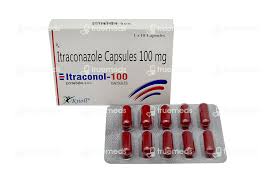Here is the complete information for Itraconazole Capsule 100 mg:
💊 Itraconazole Capsule 100 mg
🧪 Generic Name:
Itraconazole
📦 Strength & Form:
- Capsule: 100 mg
- Route: Oral
🩺 Indications / Uses:
Itraconazole is a broad-spectrum antifungal used for treating:
- Dermatophytosis (skin fungal infections like ringworm, athlete’s foot, jock itch)
- Onychomycosis (nail fungal infections)
- Systemic mycoses like:
- Histoplasmosis
- Blastomycosis
- Aspergillosis (chronic)
- Sporotrichosis
- Candidiasis (oral, esophageal, or vaginal) – if fluconazole fails
- Prophylaxis in immunocompromised patients (e.g., transplant or neutropenia)
⚖️ Dosage:
Always administer after full meals for proper absorption.
- Dermatophytosis:
100 mg once or twice daily for 15–30 days - Onychomycosis (pulse therapy):
200 mg twice daily for 1 week/month × 3–4 months - Systemic Fungal Infections:
200–400 mg/day in 2 divided doses
Duration: Weeks to months depending on infection
⚠️ Precautions:
- Do not use in heart failure (CHF): Risk of worsening
- Avoid in hepatic impairment – requires monitoring
- Monitor liver enzymes regularly during prolonged therapy
- Caution if co-administered with drugs that affect QT interval or CYP3A4
🚫 Contraindications:
- Known hypersensitivity to itraconazole
- Pregnancy – especially during first trimester
- Concurrent use with:
- Cisapride
- Quinidine
- Pimozide
- Certain statins (simvastatin, lovastatin)
💥 Side Effects:
- Nausea, vomiting, abdominal pain
- Skin rash or itching
- Headache, dizziness
- Hepatotoxicity (rare but serious)
- Edema or congestive symptoms (CHF risk)
- Menstrual irregularities (rare)
📌 Special Notes:
- Absorption is better in acidic environment
Avoid antacids/PPI within 2 hours of dosing - Requires long-term use for nail infections or systemic disease
- Available in capsule, solution, and injection (rare)

